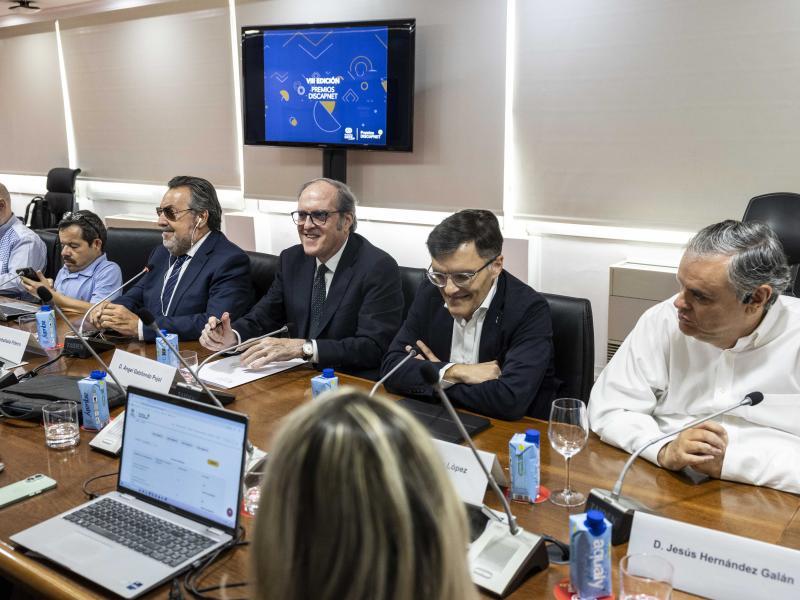
The awards recognize the best initiatives in the field of technologies applied to improving the quality of life for people with disabilities.
The jury for the 8th edition of Fundación ONCE’s Discapnet Awards for Accessible Technologies has selected 12 finalists from all the entries received from all categories of this year's competition.
The jury meeting, chaired by Miguel Carballeda, president of the ONCE Social Group, took place at Fundación ONCE’s headquarters in Madrid. Other jury members include Ombudsman, Ángel Gabilondo; DigitalES CEO, Miguel Sánchez Galindo, IBM Spain, Horacio Morell; and Spanish Committee of Representatives of People with Disabilities’ (CERMI) president Luis Cayo Pérez Bueno.
The Discapnet Awards recognize the best initiatives and actions in the field of technologies that improve the quality of life for people with disabilities, as well as companies, entities, and organizations that have carried out sustained work in the field of technological accessibility.
As in the previous edition, the awards are structured in four categories: Best Product or Service; Best Person, Entity, or Organization; Best Social Impact Entrepreneurship Project; and Best Media Outlet.
Category A recognizes the best technological product or service designed to improve the quality of life for people with disabilities that is already available on the market. This year, the jury has selected the following finalists:
- Luz-IA, from the Spanish Cystic Fibrosis Federation. An application based on generative AI that provides information on emotional well-being, mental health, as well as psychosocial resources.
- VR DOWN, developed by DeuSens in collaboration with the Vass Foundation and Down España. A pre-employment training platform based on virtual and mixed reality, developed for devices such as the Meta Quest 3 headset. It offers virtual scenarios to make easy obtaining knowledge on solve every day and work-related tasks.
- ELLIOT, from the Carmen Pardo-Valcarce Foundation (A LA PAR). A mobile application that offers accessible training on essential skills for independent living for people with intellectual disabilities.
Category B awards the individual, company, entity, or organization that has most distinguished itself through its sustained efforts in improving accessibility to technology. The nominees for this category are:
- TECSOS Foundation, for its long trajectory in developing and implementing social technologies aimed at vulnerable groups.
- Center for the Development of Inclusive Technologies at the Pontifical Catholic University of Chile, for developing initiatives since 1994 aimed at promoting inclusion using technology.
- Natalia Rodríguez Núñez-Milara, founder and CEO of Saturno Labs, for her extensive experience developing AI-related projects. She has received the National Innovation Award from the Government of Spain, and the company has been selected by Amazon as one of the world's most innovative teams in the use of AI.
Category C recognizes the best social impact entrepreneurship project aimed at improving the quality of life for people with disabilities through ICTs. This year's finalists are:
- AutisMID Videos, by IDAPP MIND. A platform with interactive videos designed to help people with autism resolve everyday situations. The interaction allows them to practice decision-making.
- Punto Health, by Punto Health. An AI-based digital platform that aims to improve the quality of life for people with cognitive impairment by identifying the impairment and providing support throughout the process.
- Mi-GuIA, by Imbotics Technology&Innovation. A device that is integrated in the white cane to help blind users detect high obstacles. This device is complemented with voice instructions.
Category D awards the media outlet that has most distinguished itself in disseminating initiatives, projects, products, and services related to accessible technologies to the public. The media outlets shortlisted are:
- Planeta Fácil Noticias, from the Plena Inclusión España. News in easy-read that cover a wide variety of topics, both nationally and internationally.
- Gente Accesible, a section of the radio program Gente on Canal Sur, created in collaboration with EVERYone Consultores. It includes accessibility content in a general-interest program broadcast during prime time (Saturday mornings).
- Cadena Ser Euskadi, Radio Bilbao. They broadcast content on digitization and accessibility. They have also developed a project to clone the voice of Kepa Junkera, the renowned Bilbao accordion player who lost his voice.